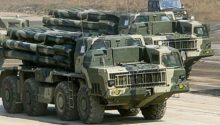contributors
Andrei Akulov

Colonel, retired, Moscow-based expert on international security issues
all articles


Those who are going to any length to dismantle George H. W. Bush’slegacy should look into his reasoning for maintaining good relations with Russia with clear gains for his nation.


The overall deterioration of the US-Russian relations may provoke lawmakers into backing any anti-Russian bill. Adopting such an approach means shooting oneself into the foot.


The US announced its withdrawal from the INF Treaty without having an intermediate ground-based missile to deploy. It made arms control pundits wonder what triggered this decision.


The army’s 2018 missile and artillery arm is quite a different force compared to the one that began the process of transformation a few years ago.


It has become a trend — Russia is blamed for whatever goes wrong, without any evidence to support such accusations.


The announcement of the plans to field the HGV as early as next year prove that Russia was not bluffing. This game-changing weapon not only exists, but is already in production.


Now that the 40N6 is on active duty with the Russian armed forces, this is a game-changer that will give the military a new ability to bring down anything that flies.


The US rejected proposals to address cybersecurity as well as the problems related to space militarization. The announcement to leave the INF Treaty made the US responsible for the consequences.


With the announcement of President Trump’s decision to withdraw from the INF Treaty, the issue of Russia’s response comes to the fore.


President Donald Trump has announced the decision to exit from the bedrock 1987 Intermediate-Range Nuclear Forces Treaty (INF Treaty), which bans all land-based missiles carrying both nuclear and conventional warheads with ranges of 500 to 5,500 kilometers, or 310 to 3,420 miles shorter- and intermediate-range missiles.



